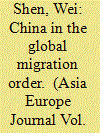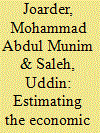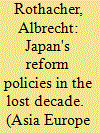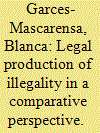|
|
|
Sort Order |
|
|
|
Items / Page
|
|
|
|
|
|
|
| Srl | Item |
| 1 |
ID:
096673


|
|
|
| 2 |
ID:
096675


|
|
|
|
|
| Publication |
2010.
|
| Summary/Abstract |
China has a long history of internal and international migration and has a significant number of diasporas around the globe. From being predominately a country of emmigration, China has now witnessed growing rates of return migration, due to its rising economic status in the world. This article seeks to provide a historical review of international migration from China in different periods, from ancient China to after the founding of the People's Republic of China. It also examines the recent trends of new waves of Chinese migration such as student migration to Europe and touches on issues of government policy and the role of overseas diasporas in the course of Chinese history. By analysing a wide range of data, including published statistics and published papers, this paper illustrates the evolution of changing patterns of international migration from China and its impact for China on the rest of the world.
|
|
|
|
|
|
|
|
|
|
|
|
|
|
|
|
| 3 |
ID:
096674


|
|
|
|
|
| Publication |
2010.
|
| Summary/Abstract |
In this article, I explore the ways bodies are trained, made and re-made in diasporic settings. Looking at South Asians in Britain, I argue that ritual practices are a relevant context to observe the process when the diasporic body is constructed. First, I bridge the gap between the anthropology of migration and the anthropology of the body through the process of diasporic self-making. Second, I explore ethnographic data on ritual activities among South Asians in Britain and outline different ways the diasporic body is constructed during these practices.
|
|
|
|
|
|
|
|
|
|
|
|
|
|
|
|
| 4 |
ID:
096679


|
|
|
|
|
| Publication |
2010.
|
| Summary/Abstract |
This paper seeks to develop a model of firm compliance behavior to environmental laws with specific focus on firms operating in Vietnam. Using an institutional approach, the paper employs Scott's (Institutions and organizations, 2nd ed., Sage, Thousand Oaks 2001) "Three pillars of institution" as the generic theoretical framework for the synthesis of literature on compliance across fields. This study used a questionnaire-based survey to examine the validity of the factors identified in the literature. The method was face-to-face interviews with the managers of 63 enterprises operating in Vietnam. The hypotheses were tested using mean importance ratings, t-test of the means, and factor analysis. Almost all the listed factors determining compliance were found to be applicable to the responding companies. The level of importance placed on different factors were analyzed using Anova test and were found to vary across companies with different sizes and business structures.
|
|
|
|
|
|
|
|
|
|
|
|
|
|
|
|
| 5 |
ID:
096677


|
|
|
|
|
| Publication |
2010.
|
| Summary/Abstract |
Following Friedman et al. (2000), we have developed an economic model of Hundi (an informal money transfer system) behavior and is designated to identify the factors that determine the channels (formal or informal) used by remitters. The model is empirically tested using Tobit analysis for a sample of 132 returned migrants of greater Sylhet region in Bangladesh with work experience in 11 different host countries. Our findings suggest that sending remittances through Hundi first increases with age, peaks at one point, and then declines thereafter. It is observed that single or unmarried migrants are more likely to remit through Hundi, while relatively educated migrants have the opposite preferences. Cost and financing of migration have significant impact on an individual's decision to choose the remitting channel. It is also found that the nature of the migration and type of job abroad affect an individual's decision to use the remitting channel. Furthermore, migrants who have no ability to speak the language of the country of destination are generally more inclined to remit through an informal channel. Finally, migrants who receive low commission to remit, have families or relatives living in remote areas and mainly dependent on remittances, and have the opportunity to remit in holidays are more likely to remit through Hundi than their counterparts.
The draft version of this paper was presented at a seminar on Annual Asian Business Research Conference organized by World Business Institute, Victoria, Australia in BIAM Foundation, Dhaka, Bangladesh during 1-2 January, 2010.
|
|
|
|
|
|
|
|
|
|
|
|
|
|
|
|
| 6 |
ID:
096676


|
|
|
|
|
| Publication |
2010.
|
| Summary/Abstract |
Migration has always been a sensitive issue as it is oftentimes driven by a sense of tragedy and loss. This paper examines the irregular sea migration of the Rohingyan Muslims who fled from Myanmar in order to escape state-sponsored socio-cultural persecution. In their quest to find sanctuary in neighboring states such as Thailand, Malaysia, and Indonesia, the United Nations High Commissioner for Refugees report that thousands are now missing at sea, drowned, or detained in holding centers for undocumented migrants. It is against this factual backdrop that the author has chosen to make an analysis of a coastal state's rights to maritime border control vis a vis its established obligations to irregular sea migrants under the United Nations Convention on the Law of the Sea, the International Convention on Maritime Search and Rescue, the International Convention for the Safety of Life at Sea, the Refugee Convention, and various international human rights instruments. Finally, key regional and bilateral initiatives that deal with the issue will be examined.
|
|
|
|
|
|
|
|
|
|
|
|
|
|
|
|
| 7 |
ID:
096680


|
|
|
| 8 |
ID:
096678


|
|
|
|
|
| Publication |
2010.
|
| Summary/Abstract |
Most studies on illegal migration focus on particular national or local settings and most theoretical approaches are built upon research done in America and Western Europe. In consequence, there is little understanding about the legal construction of the 'illegal' and the meanings of migrants' illegality in different political contexts. Given these major shortcomings, this article compares the cases of Malaysia and Spain. By comparing how we can explain illegal immigration and what it means to be illegal in each country, the final aim of this article is to place the term 'illegal' back into its context, that is, to understand the 'illegal' not as an essentialised, generic and singular object but rather as a legal and political product of particular historical and national contexts.
|
|
|
|
|
|
|
|
|
|
|
|
|
|
|
|
|
|
|
|
|